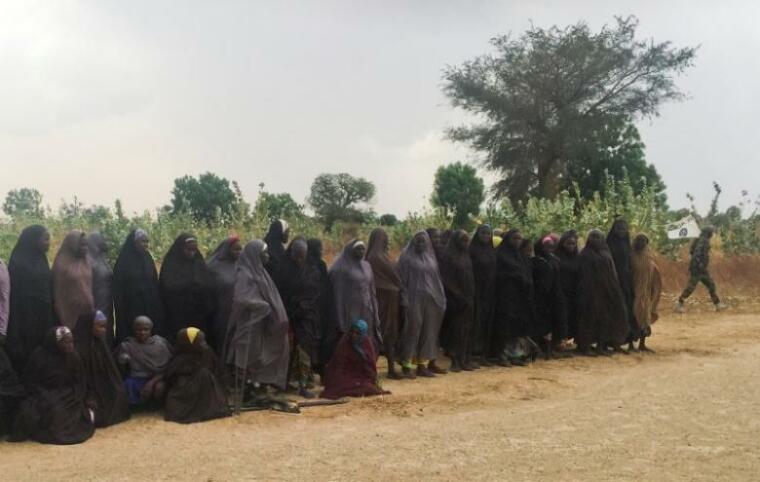Boko Haram releases new video claiming some Chibok girls don't want to be rescued

The Islamic militant group Boko Haram has released a new video purportedly showing some of the Chibok schoolgirls who do not want to be rescued as part of the swap deal with the Nigerian government.
In the three-minute video, a woman who identified herself as Maida Yakubu declared her loyalty to Boko Haram and said that she does not want to go back to her family because they are not Muslims.
"The reason is that they live in the town of unbelief. We want them to accept Islam," she said, as reported by Al Jazeera.
Earlier this month, Boko Haram released 82 out of the 276 kidnapped schoolgirls following negotiations with the Nigerian government.
However, presidential spokesman Garba Shehu said that one girl had refused to be rescued because she had married a Boko Haram fighter.
Mediator and lawyer Zannah Mustapha also said that some of the abducted girls had refused to go home, raising concerns that they may have been radicalized by the militant group and may feel afraid, ashamed or even too powerful to return to their families.
"Some girls refused to return ... I have never talked to one of the girls about their reasons," said Mustapha, who acted as the intermediary in the negotiations between the government and Boko Haram. "As a mediator, it is not part of my mandate to force them (to return home)," he added.
A total of 276 schoolgirls were kidnapped by Boko Haram in 2016, but 57 were able to escape just days after the abduction.
In October, the militant group released 21 girls after negotiations with Switzerland and the International Committee of the Red Cross. A few more girls managed to escape, but as many as 113 girls are believed to be still held in captivity by Boko Haram.
In another video, the militant group claimed that the Nigerian government had freed five Boko Haram commanders in exchange for the 82 Chibok girls.
A man who identifies himself as Abu Dardaa, or Money, warned in the video that the group is back in Sambisa Forest, preparing to bomb Nigeria's capital of Abuja.
Boko Haram has reportedly killed 15,000 people and displaced over two million since the start of the insurgency aimed at establishing an Islamic caliphate in northeastern Nigeria, according to Reuters.
Security analyst Ryan Cummings, head of risk management consultancy Signal Risk, has asserted that the release of the 82 girls could be a sign that the group is weakening, raising hopes that the remaining captives will be released one day.
"While Boko Haram may indeed hold out in releasing all of the hostages to maintain some form of leverage, the reality is that the girls have limited value to the sect outside of public relations capital and are likely placing a strain on resources," he said.
 Christians don't have to affirm transgenderism, but they can’t express that view at work: tribunal
Christians don't have to affirm transgenderism, but they can’t express that view at work: tribunal Archaeology discovery: Medieval Christian prayer beads found on Holy Island
Archaeology discovery: Medieval Christian prayer beads found on Holy Island Presbyterian Church in America votes to leave National Association of Evangelicals
Presbyterian Church in America votes to leave National Association of Evangelicals Over 50 killed in 'vile and satanic' attack at Nigerian church on Pentecost Sunday
Over 50 killed in 'vile and satanic' attack at Nigerian church on Pentecost Sunday Ukrainian Orthodox Church severs ties with Moscow over Patriarch Kirill's support for Putin's war
Ukrainian Orthodox Church severs ties with Moscow over Patriarch Kirill's support for Putin's war Islamic State kills 20 Nigerian Christians as revenge for US airstrike
Islamic State kills 20 Nigerian Christians as revenge for US airstrike Man who served 33 years in prison for murder leads inmates to Christ
Man who served 33 years in prison for murder leads inmates to Christ


 Nigerian student beaten to death, body burned over ‘blasphemous’ WhatsApp message
Nigerian student beaten to death, body burned over ‘blasphemous’ WhatsApp message 'A new low': World reacts after Hong Kong arrests 90-year-old Cardinal Joseph Zen
'A new low': World reacts after Hong Kong arrests 90-year-old Cardinal Joseph Zen Iran sentences Christian man to 10 years in prison for hosting house church worship gathering
Iran sentences Christian man to 10 years in prison for hosting house church worship gathering French Guyana: Pastor shot dead, church set on fire after meeting delegation of Evangelicals
French Guyana: Pastor shot dead, church set on fire after meeting delegation of Evangelicals ‘Talking Jesus’ report finds only 6% of UK adults identify as practicing Christians
‘Talking Jesus’ report finds only 6% of UK adults identify as practicing Christians Mission Eurasia ministry center blown up in Ukraine, hundreds of Bibles destroyed: 'God will provide'
Mission Eurasia ministry center blown up in Ukraine, hundreds of Bibles destroyed: 'God will provide' Church holds service for first time after ISIS desecrated it 8 years ago
Church holds service for first time after ISIS desecrated it 8 years ago Burger King apologizes for 'offensive campaign' using Jesus' words at the Last Supper
Burger King apologizes for 'offensive campaign' using Jesus' words at the Last Supper Uganda: Muslims abduct teacher, burn him inside mosque for praying in Christ’s name
Uganda: Muslims abduct teacher, burn him inside mosque for praying in Christ’s name